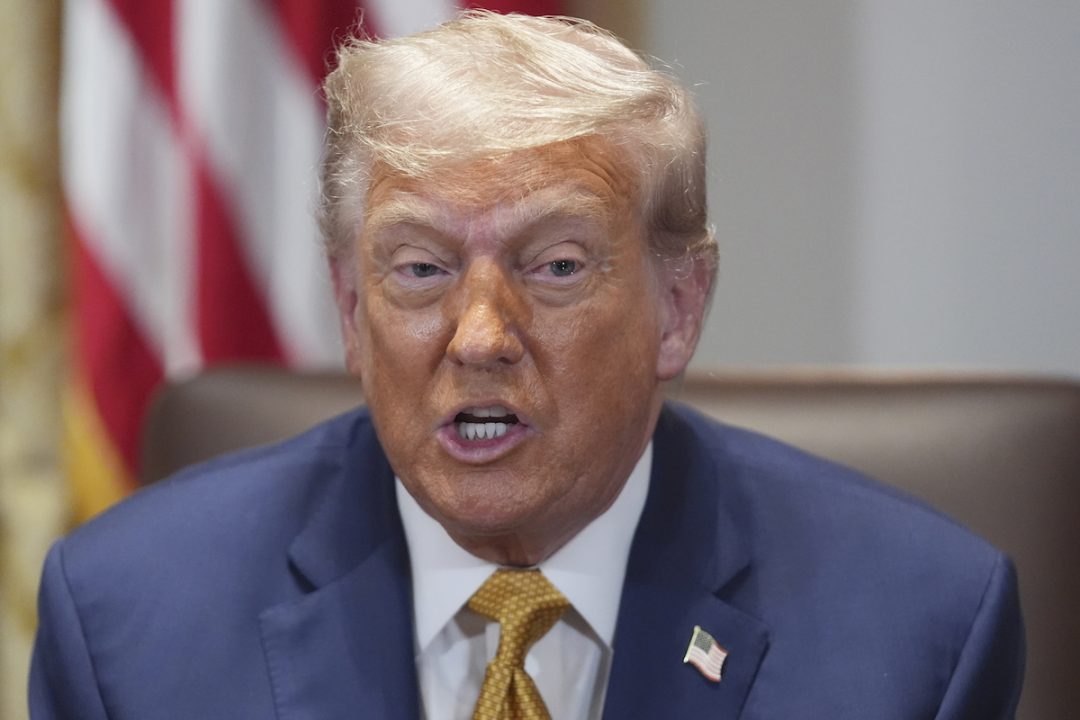
After another failed attempt to effect an end to the war in Eastern Europe, President Trump approved the delivery of a new shipment of weapons to Ukraine. And on Tuesday, he told reporters he was considering adding sanctions on Russia after labeling conversations with Vladimir Putin “meaningless.”
The move to send Ukraine a hoard of missiles, rocket launchers, and grenade launchers that the Trump administration had previously halted came after a “disappointing” conversation Trump had with the Russian president on Thursday. Trump was unable to convince Putin to end the war with his neighbor, Ukraine. Reports say Putin made clear to Trump that Russia was determined to achieve its goals, “the elimination of the well-known root causes that led to the current state of affairs.”
Trump, who said he never ordered the weapons freeze in the first place, justified resuming their delivery under pretext of Ukrainian self-defense. He said, “We have to, they have to be able to defend themselves. They are getting hit very hard. Now they are getting hit very hard. We’re gonna have to send more weapons.”
Following that announcement, Trump aired recent frustration he harbored toward Putin. He said on Tuesday during a Cabinet meeting that Putin is a nice guy, but one who throws out a lot of nonsense.
More Sanctions Coming?
Trump also indicated he’s considering Senator Lindsey Graham’s (R-S.C.) legislation to level more sanctions against Russia. The Biden administration imposed more than 6,000 sanctions on Russia, but the Trump administration has held off on adding any. The president has said a major a reason he hasn’t done so is because he didn’t think it would help his negotiations with Putin.
But as Trump’s frustration with the Russian leader grows and negotiations go nowhere, he may become more sympathetic to proposals by Graham and other neoconservatives who’ve been urging more sanctions. During his June 30 visit to Kyiv, Graham said “he expected movement soon in the Senate on advancing his bill placing strong sanctions on Russia if headway is not made toward agreeing to a ceasefire,” according to Newsmax.
Graham’s bill would level a 500-percent tariff on imports from countries that buy Russian oil, natural gas, and uranium, according to reports. How they could write it in such a way that it would hit Russia exclusively, and not the long list of countries still buying Russian oil and gas, would be quite the trick. European Union countries, for example, spent $26 billion on Russian energy just in 2024. The Europeans have tried to play a peek-a-boo shell game of virtue signaling with Russian energy. While countries such as Germany have officially banned Russian liquefied natural gas (LNG), they buy it from other countries, including France, which, along with Belgium and Spain, directly imports it from Russia.
In May, the European Commission rolled out a plan to phase out Russian fossil fuels by 2027. The plan, according to reports, would include banning new gas contracts with Russia suppliers by the end of this year and phasing out all other imports by 2027. But many are skeptical Europe can become completely weaned off Russian energy. The EU imports about 19 percent of its energy from Russia. France increased Russian LNG import by 81 percent in 2024. As of now, American LNG dominates European supply overall.
Unpopular Intervention
Trump’s reluctance to completely disengage the United States from any involvement in the war between Ukraine and Russia is disappointing to many Americans, especially Republican voters, a majority of whom want no involvement in Ukraine. While Trump shouldn’t be faulted for trying to affect peace in the region, his decision to continue supplying weapons to Ukraine makes the U.S. a participant in the war. And there’s no telling where that participation, however restricted, could lead. Many fault decades of U.S. meddling by neoconservative planners for the war in the first place. You can read more about that in our reports here and here.
If the American people elected leadership who believed in the foreign policy advocated and practiced by the Founding Fathers and the American generations of the 19th century, the U.S. would not be involved in Eastern Europe — or anywhere else in the world. The Framers warned against being drawn into Europe’s perpetual conflicts. Their prescription was non-intervention. They endorsed peaceable relations and business dealings with all countries that would have it. The United States remained largely disengaged from foreign affairs until the 20th century, which kicked off the era of American intervention with a series of suspected false flag attacks and accompanying coverups. More than a century later, the American people find themselves with an “America First” president who sees no contradiction between his slogan and military intervention in wars between countries that pose no threat to the United States.





